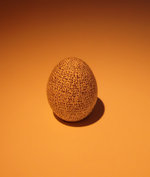Tohu wa-bohu

Tohu wa-bohuorTohu va-Vohu(Biblical Hebrew:תֹהוּ וָבֹהוּṯōhū wāḇōhū) is aBiblical Hebrewphrase found in theGenesis creation narrative(Genesis 1:2) that describes the condition of the earth ('aretz) immediately before thecreation of lightinGenesis 1:3.
Numerous interpretations of this phrase are made by various theological sources. TheKing James Versiontranslation of the phrase is "without form, and void", corresponding toSeptuagintἀόρατος καὶ ἀκατασκεύαστος,"unseen and unformed".
Text
[edit]וְהָאָ֗רֶץ הָיְתָ֥התֹ֙הוּ֙ וָבֹ֔הוּוְחֹ֖שֶׁךְ עַל־פְּנֵ֣י תְהֹ֑ום וְר֣וּחַ אֱלֹהִ֔ים מְרַחֶ֖פֶת עַל־פְּנֵ֥י הַמָּֽיִם
— Genesis 1:2,Westminster Leningrad Codex[1]
Now the earth was formless and empty, darkness was over the surface of the deep, and the spirit of God was hovering over the waters.
— Genesis 1:2,New International Version[2]
The wordstohuandbohualso occur in parallel inIsaiah 34:11,which theKing James Versiontranslates with the words "confusion" and "emptiness".
The two Hebrew words are properlysegolates,spelledtohuwandbohuw.[3]Hebrewtohuwtranslates to "wasteness, that which is laid waste, desert; emptiness, vanity; nothing".[4]Tohuwis frequently used in theBook of Isaiahin the sense of "vanity", butbohuwoccurs nowhere elsein the Hebrew Bible (outside of Genesis 1:2, the passage in Isaiah 34:11 mentioned above,[5]and in Jeremiah 4:23, which is a reference to Genesis 1:2), its use alongsidetohubeing mereparonomasia,and is given the equivalent translation of "emptiness, voidness".[3]
Rabbinical interpretation
[edit]In theearly rabbinical period,the verse was a point of contention regarding the question ofcreatio ex nihilo.InGenesis Rabbah1:14,Rabbi Akivarefutesgnosticand other heretical views that matter existed primordially and that God alone did not create the world.[6] InGenesis Rabbah2:2, theamoraimAbbahuandShimon ben Pazigive analogies in whichtohu wabohumeans "bewildered and astonished" (mentally formless and void), referring to the Earth's confusion after, having been created simultaneously with the Heavens in Genesis 1:1, it now immediately plays an inferior role.[7]
In the 12th century,Abraham bar Hiyyawas the first to interpret thetohuandbohuof Gen. 1:2 as meaning "matter" and "form", and the same idea appears in the anonymousBahir2.9–10, which was probably edited by theHachmei Provence.[8]
Possibly related to the concept of "formless and void" is theYesod hapashut(Hebrew:יְסוֹד הפשוט,lit. 'simple element') in theKabbalah,in which "everything is united as one, without differentiation".[9]ArtScroll's Stone EditionChumashtranslates the phrase as "astonishingly empty".[10]ArtScroll translates in accordance toRashi,the most famous medieval Jewish biblical commentator on theTorah.
Use in modern culture
[edit]The phrase is featured on the front ofGodspeed You! Black Emperor'sEPSlow Riot for New Zero Kanada,referring to the use of the phrase in Jeremiah 4:23.[11][12]Jeremiah 4:23-27 is shown on the back of the album cover.[13]
Tohuvabohuis the name ofKMFDM's 15th studio album, as well as the title track on the album.
Tohu and Bohu are monsters in the superhero web serial novelWorm.
See also
[edit]References
[edit]- ^"Genesis 1:2 בראשית",Tanach: Unicode/XML Westminster Leningrad Codex,transcribed by Christopher V. Kimball.
- ^"BibleGateway: A searchable online Bible in over 150 versions and 50 languages".biblegateway.
- ^abWilhelm Gesenius,A Hebrew and English Lexicon(1906).
- ^Strong's ConcordanceH8414
- ^Strong's ConcordanceH922
- ^Louis Isaac Rabinowitz; Seymour Feldman; Yehoyada Amir (2007), "CREATION AND COSMOGONY IN THE BIBLE",Encyclopaedia Judaica,vol. 5 (2nd ed.), Gale, pp. 273–280
- ^Midrash Rabbah:Genesis, Volume One,translated by Rabbi Dr.H. Freedman;London: Soncino Press, 1983;ISBN0-900689-38-2;p. 15.
- ^K. Schubert (2003), "CABALA",New Catholic Encyclopedia,vol. 2 (2nd ed.), Gale, pp. 831–836
- ^Chaim Kramer,Anatomy of the soul,Breslov Research Institute,Jerusalem/New York City1998ISBN0-930213-51-3
- ^Scherman, Nosson (Nov 1, 1993).Stone Edition Chumash.New York: ArtScroll. p. ad loc.ISBN9780899060149.
- ^Pearl, Jacob (17 January 2013)."Some Serious Music: Spektor, Cohen, and Godspeed You! Black Emperor".Jewish Currents.Retrieved18 July2020.
The band's tendency to draw from ambiance rhythm and then fall back into ambiance is summed up by a snippet of Hebrew text, "tohu wa-bohu,"which Godspeed used as the front of their 1999 album,Slow Riot for New Zero Kanada.The phrase, which means "formless and empty,"is used in Genesis to describe the world before creation, and in Jeremiah to describe the land after a war that has desolated it.
- ^Sirota, Brent (1 January 2001)."Top 10 Albums of 1999".Pitchfork Media.Retrieved18 July2020.
The Hebrew on the cover of Godspeed You Black Emperor's latest EP is pronounced "tohu va-bohu." It means "void and waste," and it's a phrase you can find all over the Old Testament. It's what the earth was before the creation and it's what the earth will look like after the coming Day of the Lord.
- ^"//////////".//////////.Retrieved2020-07-17.
External links
[edit]- Go toBibliotheca Sacra and Theological Review.Allen, Morrill, and Wardwell. 1 January 1870.,p.419for info on related word inIsaiah Chapter 22calledmekuddash(מקדש) which is Hebrew for "it issanctified"

